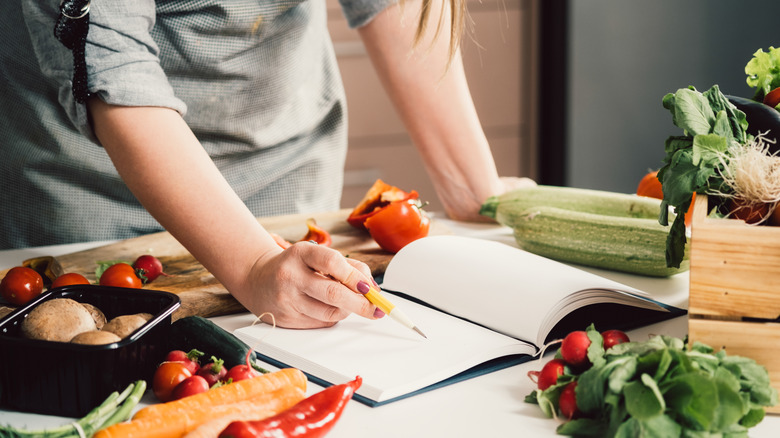The Key Sign Of A Good Recipe Is All In The Details
It is a truth universally acknowledged, that a single cook in possession of good ingredients must be in want of a recipe. While many would dispute the opening line of "Pride and Prejudice," our revision does hold true when it comes to the culinary arts. It's easy enough to wing a simple salad or sandwich, true, but for anything more complicated, a good recipe can be your best friend (even if you only use it as a jumping-off point). The problem lies in determining exactly what makes a recipe good, but one rule of thumb to follow is to look for one that's as specific as possible.
Vague directions are seldom helpful — if you're cooking a milk-based sauce, "heat until hot" lacks the necessary directive "stir to prevent scorching." It also helps if a recipe not only says "reduce the sauce by ¼" but, for those of us not experts at visual volume estimation, adds the detail "and coats the back of a spoon." Time ranges, too, are crucial, since a good recipe lets you know whether you'll be standing over the stove for two minutes or two hours. Specificity even extends to the ingredients list where a good recipe will let you know what they mean by "small lemon," whether it's one inch in diameter or two. The very best recipes, in fact, tell you not only that you'll need that single small lemon, but also measure the juice so you're sure to have the right amount.
These are recipe red flags
The best recipes leave little doubt about what you need to do, when, and maybe even why (a dissertation on kitchen chemistry isn't necessary, but it's nice to know why margarine works better than butter) along with how much and what type of each ingredient you'll need to use. When you read through a recipe and are left with any questions, your best bet is to keep hunting for another way to make whatever dish you have in mind. That being said, even detailed recipes may fail in execution, so it's best to look out for other potential problems.
One issue raised by a Redditor on a r/AskBaking thread is that of recipes suggesting ingredient swaps that "should" work but likely haven't been tested, particularly if they omit necessary adjustments to cooking time and temperature when swapping, say, a pork chop for a chicken breast. Other issues include recipe developers making absurd claims such as onions that caramelize in 15 minutes or directions that assume we're all able to cook at TikTok video speed and finesse the cooking and prep time to make it much, much shorter. Do the math: If a recipe calls for 10 minutes of sauteing here, 5 minutes of parboiling there, then 35 minutes of baking time followed by a 15-minute cool-off and yet it claims that this dish can be "on the table in under half an hour," look elsewhere.

